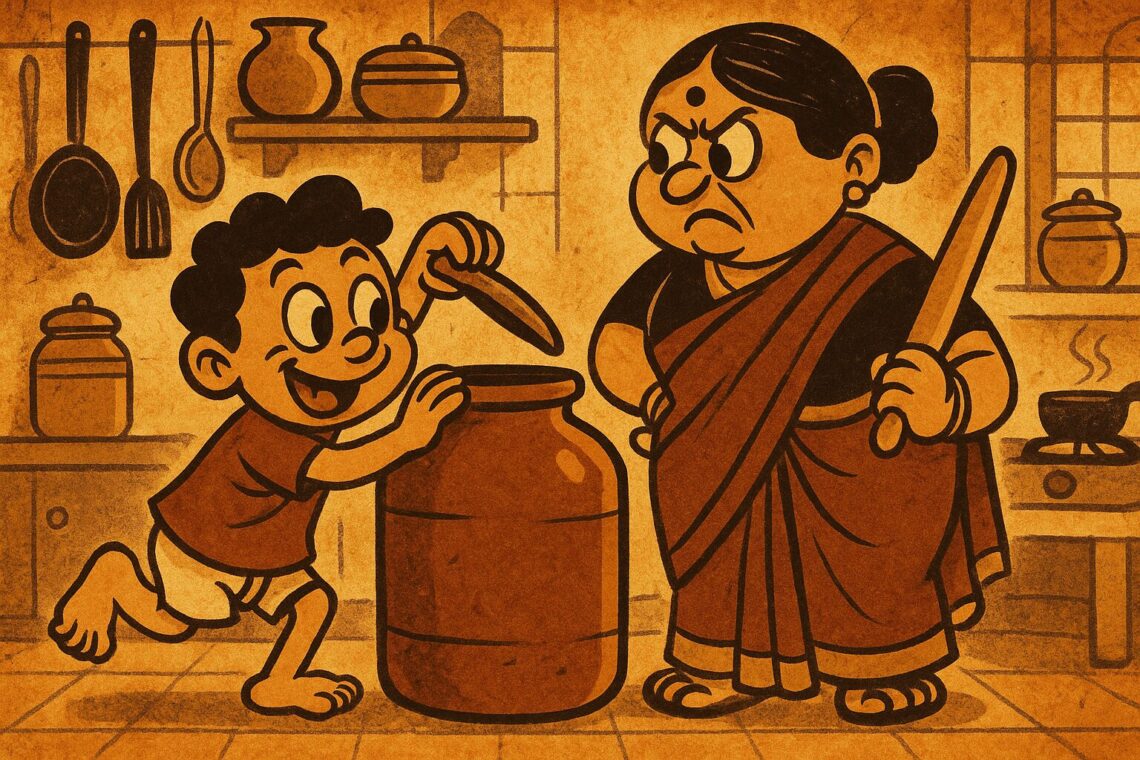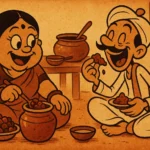In every Indian kitchen—usually on the highest shelf, in a sunlit corner or behind an intimidating steel mesh—sits a jar that radiates quiet authority. The achaar martbaan. Not just a vessel of condiments, but an object with its own rituals, boundaries, and gravity. In my childhood home in Mumbai, the martbaan was less a container and more a personality. You didn’t just open it. You approached it. With clean hands, dry spoons, and a mild sense of reverence.
My grandmother treated that jar like a holy relic. No wet hands. No double dipping. No tilting. It had its own spoon, its own plate, and its own unpredictable moods. One wrong move, and entire summer’s worth of mangoes could ferment into regret. “Don’t touch the pickle jar,” she’d say—not as a rule, but as a warning handed down generations.
Where the Pickle Jar Lives
The martbaan was always stored in places you couldn’t reach unless you were truly motivated. High up, sometimes wrapped in old cotton towels or nestled in a cool pantry corner. It didn’t sit near the everyday spice rack or clingy plastic containers. No, this jar had seniority. It had earned its place. Often ceramic, sometimes glass, always opaque in origin. No one knew when it was bought or who first filled it. It just… existed. Like the moon. Or the fridge’s mystery drawer.
Every summer, a new batch would arrive—aam ka achaar with methi and red chili, nimbu with jaggery, mirch ka achaar for the brave. Each martbaan came with its own backstory and distinct smell. No two jars were ever exactly the same, no matter how precisely the recipe was followed. Something about the year’s mangoes. The strength of the sun. The patience of the hand stirring it every few days. It was alchemy in a jar. With attitude.
The Achaar Code of Conduct
Let’s be clear: you don’t serve achaar casually. It’s not a condiment you slather. It’s a punctuation mark—added carefully, one spoon at a time, to a bland dal, a boring paratha, or a moody curd rice. And that spoon? It better be dry. The cardinal sin in any Indian kitchen is the wet spoon in the pickle jar. It’s worse than burning the tadka, worse than oversalting the curry. A wet spoon spells doom. Mold. Sourness. Waste. And eternal shame.
Which is why every home had a separate, mysterious tiny spoon—usually with a slightly bent handle—that lived near the jar. If you couldn’t find it, you didn’t get achaar. Simple.
Fermentation, but Make It Spiritual
Long before fermentation became a buzzword on wellness podcasts, Indian kitchens were doing it quietly—with mangoes, lemons, chilies, and a cocktail of spices that knew how to work over time. Pickle-making was a ritual. You sun-dried the ingredients. You massaged the oil and spices in with your hands. You prayed for the right kind of humidity. You stirred it every morning like it was a pot of gold—carefully, reverently, while muttering, “Not too much, or it’ll get bitter.”
This wasn’t just food. It was domestic witchcraft. Each jar was an ecosystem. And the person who made the achaar? A benign sorceress in a cotton saree who smelled faintly of methi seeds and knew exactly how much salt was “just enough.”
It’s Not Just Pickle. It’s Personality.
The achaar you were offered at someone’s house said a lot. The strong, spicy mango? Confident cook. The tangy imli with jaggery? Gentle soul. The one with hing so strong it cleared your sinuses for a week? Fearless aunties who didn’t believe in moderation. And then there was the occasional wildcard—green apple achaar or gobi achaar—experimental minds, usually with foreign soap in the guest bathroom.
The Diaspora Jar
In Austin, my own martbaan sits modestly in a corner cupboard. It’s not ceramic. It’s a repurposed jam jar, filled with store-bought Punjabi mango achaar that I’ve “doctored” with mustard oil and extra salt. It’s not the same. But it tries. On certain days—rainy mornings or homesick nights—I unscrew it, sniff, and wait for memory. The smell always delivers. It takes me back to the old kitchen, to the sound of oil crackling, and to the sight of my grandmother smacking my cousin’s hand away with, “Don’t touch the pickle jar!”
Sealed with Oil and Memory
Pickle jars don’t last forever. They run out. They go bad. They get replaced. But the aura lingers. Even now, when I see a ceramic jar at a flea market or a tall glass container with an oddly bent spoon, I stop. I smile. I remember. That smell, that sting, that tang of home packed into one forbidden scoop.
So no, it’s not just about not using a wet spoon. It’s about respecting the spice. Honoring the slow. And leaving some things untouched—until the time, the meal, and the spoon are just right.
Born in Mumbai, now stir-frying feelings in Texas. Writes about food, memory, and the messy magic in between — mostly to stay hungry, sometimes just to stay sane.












